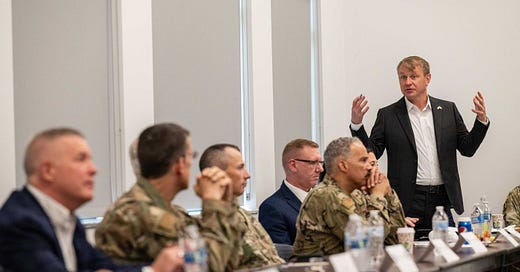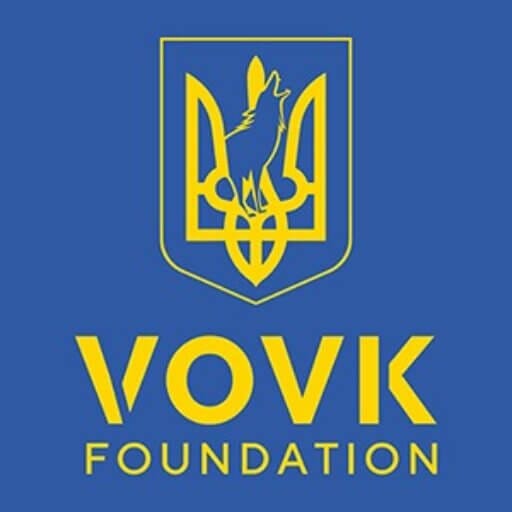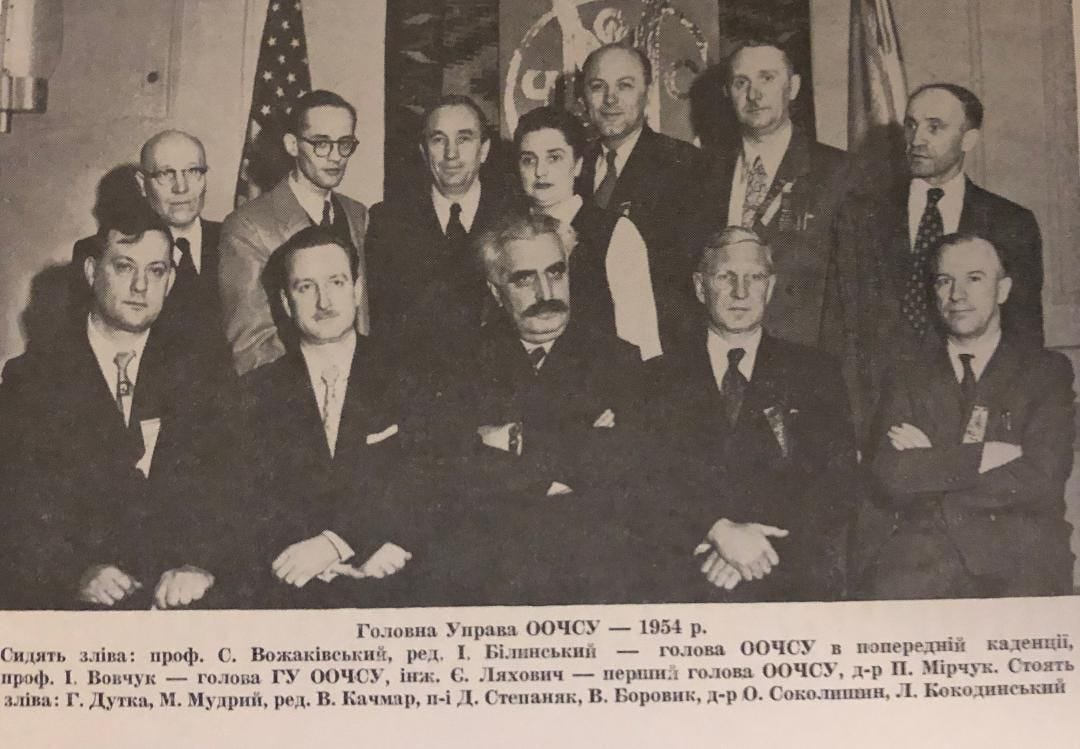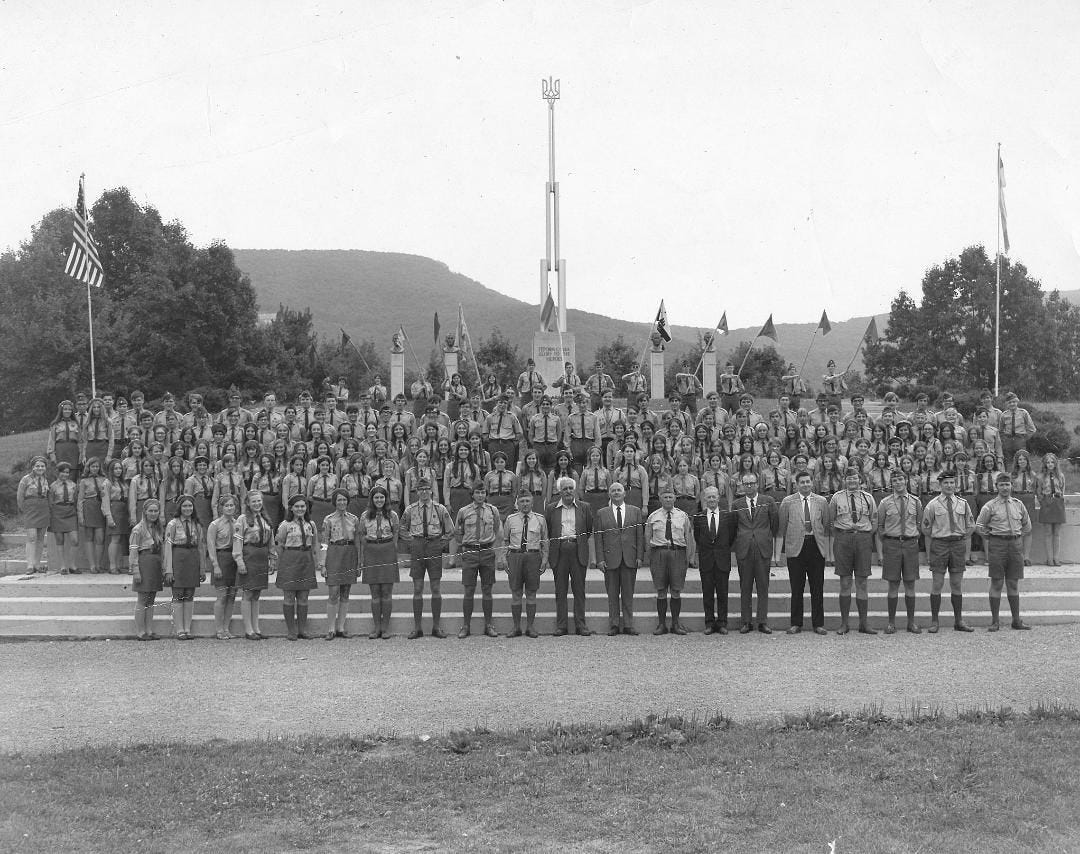Even if he was a Banderite, Andrew Wowczuk (1948-2022) was “considered a world expert/thought leader in implementing … continuous improvement methodologies for the manufacturing and military services industries,” according to SUNY Maritime College, at least after Wowczuk donated $50,000 in 2020. “His career,” they said, “included leading roles at Fortune 500 companies including General Electric, where he led continuous improvement efforts in the freight locomotive division, and Westinghouse as lead engineer for the Commercial and Navy Nuclear Division.”
According to Wowczuk’s obituary, “In his final years, Andrew worked alongside his three sons in moving US Defense Innovation forward at the Civil-Military Innovation Institute Inc,” which they co-founded together. Last year, his sons established a family foundation in his honor, but named it after their grandfather, a close associate of Stepan Bandera and US leader of Bandera’s Organization of Ukrainian Nationalists (OUN-B). Now the Wowczuk brothers are trying to “reactivate” an OUN-B front group in the Pittsburgh area.
part one — THE ‘SMART DEFENSE’ COMPANY
“And boy, Zenovy Wowczuk is with us tonight,” said Governor Jim Justice (R-WV), who is running for US Senate next year, during his 2023 West Virginia State of the State Address. Zenovy is the youngest of the Wowczuk brothers, and Yurij is the oldest. There is not much to say about the second-born, Borys, except that he’s a board member of a regional Ukrainian credit union, and has posted some OUN stuff on social media. The Wowczuks appear to already have an ally in Senator Shelley Moore Capito (R-WV), whose son, Moore Capito, is vying to be the next governor. The gubernatorial candidate appointed Zenovy Wowczuk to his campaign’s “West Virginia Business Council Advisory Board.” According to an online bio,
[Zenovy Wowczuk] spent eight years in management positions for firms specializing in rapid development of products to support the warfighter. The focus areas of these firms ranged from aerial platform system integration and aerial/ground power systems to biometric technologies. Zenovy is also co-founder of four defense-focused startups in the Washington, D.C., Pittsburgh and Morgantown areas. He is a co-inventor of multiple patented technologies and methods for sensor/electronic payload systems for military aircraft (manned and unmanned). His research efforts have led to co-authoring multiple journal articles and conference proceedings on topics including aircraft system design and advanced C4ISR system architectures.
Yurij Wowczuk, the oldest brother, is obviously on board with the Banderites. He has said that Dmytro Dontsov (1883-1973), the Ukrainian fascist ideologue, “definitely solidified my beliefs and point of view as a teenager, young adult.” Less than 300 people have “liked” the OUN-B’s official Facebook page (est. 2023), and Yurij is one of them. He studied economics and Ukrainian literature at Harvard University in the 1990s, and spent most of the past decade working in a senior position for Matthews International, which “designs, manufactures, and markets memorialization products and brand solutions for the cemetery and funeral home industries in the United States, Mexico, Canada, Europe, Australia, and Asia.”
By 2017, the Wowczuk brothers created the Civil-Military Innovation Institute (CMI2) in Morgantown, West Virginia, and appear to have co-founded Necessity Ventures, “a venture capital firm that makes strategic tactical investments in innovative companies supporting the America First vision.” The CMI2 grew out of the “Smart Defense Consortium,” which ran the “Center for Smart Defense” at West Virginia University in Morgantown, just south of the Pennsylvania border. According to an early tax filing, “The Center will initiate research partnerships between West Virginia University faculty, staff, and students and outside organizations inside the Department of Defense and the broader national security community.”
Zenovy Wowczuk formerly directed the Center for Smart Defense (CSD) with Adam Jay Harris—now the managing partner at Dead Run Ventures. Zenovy filed the paperwork for the latter to have its name changed from “Necessity Ventures Global Investments.” After co-founding the CSD, in 2015-18, Harris was the inaugural director of the “MD5 National Security Technology Accelerator,” now called the “National Security Innovation Network,” which according to Wikipedia is a “Department of Defense program office under the Defense Innovation Unit.” For a week in 2017, the Smart Defense Consortium was renamed the MD5 Institute, which then became “CMI2.”

According to its website, the CMI2 “bridges the gaps in defense innovation.” Its vice president doubled for several years as the Director of Business Development (third in command) of the DoD’s National Security Innovation Network. Meanwhile, the COO of the Civil-Military Innovation Institute is a former district representative for the CMI2’s favorite Congresswoman, Shelley Capito. Retired US general Buford “Buff” Blount has chaired the CMI2 since 2017, the year that it was born. At the outset of the “Global War on Terrorism” and the invasion of Iraq, Major General Blount commanded the 3rd Infantry Division of the US Army which captured Baghdad and prompted George W. Bush to declare, “Mission Accomplished.”
In his 2023 State of the State Address, Gov. Jim Justice praised the CMI2’s “Adaptive Experimentation Facility” in Fola, which sits on a former coal mine in the heart of West Virginia, as a “one of a kind military capability.” Justice announced that CMI2 was “awarded $100 million in a new contract from the defense people and literally they’re promising more and more and more to come.” Last month he participated in the official ground-breaking ceremony for the next phase of the Fola facility, which is said to be “for advanced military training and technology experimentation.”
Referring to CMI2’s “business incubator campus” in Morgantown, the Republican governor declared earlier this year, “West Virginia is becoming an ideal location for defense companies wanting to develop new tactics.” In the springtime, WV Metro News reported that “300 of the top-trained soldiers in the U.S. Army were being put to the test” at the CMI2-operated facility in Fola, “including the 101st Airborne Division from Fort Campbell, Kentucky, and the 82nd Airborne Division from Fort Bragg, North Carolina.” Around then, Senator Capito said she was “proud that U.S. Cyber Command is … harnessing the forward-thinking expertise of West Virginia’s own Civil-Military Innovation Institute.”

The Smart Defense Consortium seems to have another successor based in Arlington, Virginia, probably co-founded by the Wowczuks. At some point, a client of the graphic design company “99designs” with the username “zwowczuk” ran a logo contest with the prompt, “We are rebranding from ‘Smart Defense’ and ‘Smart Defense Consortium’ to ‘One Defense’ and ‘One Defense Consortium.’” According to One Defense, which uses the winning logo, they have “assisted dozens of domestic & international venture-backed technology companies seeking to support the United States Department of Defense, Department of State and Intelligence Community. Our work for these clients range from advising on strategic acquisitions to acting as operating partners for technology firms on behalf of venture and private equity stakeholders.” The leadership team has multiple ties to the Atlantic Council.
part two — A BANDERITE FAMILY FOUNDATION
When Nazi Germany invaded the Soviet Union, the OUN formed “expeditionary groups,” which according to historian John-Paul Himka, “were small OUN units that fanned out from Kraków and then across Ukraine, following the German advance. They were instrumental in establishing local civil administrations and militias wherever they went.” When the Banderites reached Nikopol, a city in southern Ukraine, members of their expeditionary group allegedly sought out Fedir Vovk, because they heard about him, a “conscientious Ukrainian” school director, and wanted to recruit him for the Nazi puppet civil administration.
During the first year of the Holocaust, Vovk provided shelter for the family of a Jewish teacher at his school, which posthumously earned him the title of “Righteous Among the Nations.” Later in the war, the local OUN-B leader relocated to western Ukraine, changed his name to Ivan Vovchuk, and became a vice president of the Ukrainian Supreme Liberation Council—established in 1944, if only on paper, as the “democratic” underground government of the genocidal Banderites in Ukraine.
After the war in Germany, the man formerly known as Fedir Vovk co-founded the Ukrainian Youth Association, a Banderite “facade structure” that groomed the next generations of OUN-B diaspora leaders around the world. A serious rift developed among the Banderite emigres in the first years of the Cold War that boiled down to a power struggle between the (CIA-backed) Foreign Representation of the Ukrainian Supreme Liberation Council and Stepan Bandera’s Foreign Units of the OUN, which “tried to establish a dictatorship in exile that would be transferred to a liberated Ukraine,” according to Per Rudling. “Ivan Vovchuk” was a member of both groups, but stuck with Bandera, and became one of his trusted associates.

The OUN-B leadership soon dispatched Vovchuk to the United States, where he largely took the reins of the Banderites’ new network. In the coming years, the CIA internally objected to the “organization of an underground BANDERA organization in the USA which blindly executes all orders” of the OUN-B leadership. In 1959, Vovchuk spoke at Bandera’s funeral, and already sat on the political commission of the Ukrainian Congress Committee of America (UCCA). By the early 1970s, the CIA recognized “Ivan Vovchuk” as one of the US leaders of OUN-B, and he was the head of political affairs for the UCCA. At one meeting of the UCCA executive board in 1974, Vovchuk stressed “the urgency of consolidating Ukrainian life in America; above all, he reported on the state of Ukrainian schools.”
The Wowczuk brothers established the Vovk Foundation a year ago, in part to “promote defense and commercial innovation activities,” and to “amplify the facts about Ukraine and Ukrainian Nationalism.” Its website honors their grandfather as a “leader of the Organization of Ukrainian Nationalists.” Zenovy Wowczuk is the president of the foundation, which shares a mailing address with the Civil-Military Innovation Institute, but his oldest brother could be calling the shots. It was Yurij Wowczuk that recently announced “the official restart and reactivation” of an OUN-B front group in the Pittsburgh area.
This year the Vovk Foundation partnered with the Ukrainian National Women’s League of America to create a college scholarship for Ukrainian Americans. In August, the UNWLA awarded the first “Vovk Foundation Scholarship” to a student at Harvard University’s John F. Kennedy School of Government, who dreams “to be a senior U.S. government advisor to Ukraine.” Later that month, the Vovk Foundation recognized the 140th birthday of Dmytro Dontsov, and Yurij Wowczuk recorded a podcast episode about this fascist ideologue, whose “insightful and timeless philosophies, rooted in a ‘stone heart and burning faith,’ paved the way for the emergence and continued evolution of the Ukrainian nationalist ideology through active nationalism.”
“No doubt that Dontsov’s philosophy had an influence on my grandfather’s writings, speeches, and approaches to supporting the diaspora,” Yurij Wowczuk said in the podcast episode with his uncle, who once reviewed Trevor Erlacher’s 2021 biography of Dmytro Dontsov. (“In further reading of the book, however, I find a weakness in the author’s aversion to discussing the blank pages of Ukrainian history [original emphasis] … I find that the purpose of the deliberate drum beat about Ukrainian Anti-Semitism, is to deflect the knowledge about the complicity of the Jewish NKVD participation and leadership in the execution of the Holodomor …”)
“Can you recall any discussions with my grandfather about Dontsov, his colleagues, and the origins of Nationalistic thoughts?” Yurij asked. “Uncle Peter” answered, apparently no longer talking about Dontsov, but Vovchuk: “In our family we respected him and his deep knowledge. My parents told me that he was the chief ideologue of the Ukrainian Nationalist political platform.” For much of the 1950s and 1970s, Vovchuk led the New York-based Organization for Defense of the Four Freedoms of Ukraine (ODFFU), which spearheaded the US coalition of Banderite front groups that seized control of the Ukrainian Congress Committee of America. Now his grandsons want to revive Chapter 21 of the ODFFU in the Pittsburgh tri-state area. Yurij Wowczuk announced online that he “would like to host an organizing meeting this Sunday, December 17th” in Cargenie, Pennsylvania, not without hashtags such as #ukraine #pittsburgh #odffu #morgantown and others, including #OUN.
This year the Banderites recognized the 120th anniversary of the birth of Ivan Vovchuk. In July, the ODFFU and UCCA donated humanitarian aid to a couple Ukrainian military units in Nikopol, an act of charity that the ODFFU dedicated to his memory. “The Vovk Foundation is excited to support this important endeavor,” commented Yurij Wowczuk. More recently, the Vovk Foundation publicly thanked Viktor Rog, the director of the OUN-B’s publishing house and chief editor of its weekly newspaper, for producing a book of articles and essays by Ivan Vovchuk. According to the director of the “Ukrainian Information Service,” another OUN-B front, Vovchuk was “an uncompromising destroyer of Moscow’s imperial myths,” not just because he protected a Jewish family and came from southern Ukraine, but he even argued that the concept of Russian people was “completely artificial.” Much like Bandera, he apparently considered World War III to be inevitable.
UPDATE (24 HRS LATER):
“You will hear from our attorney,” says Yurij Wowczuk—a subscriber of the Bandera Lobby Blog for over a year. Yesterday he announced, “I am humbled and honored to be appointed the Director of Research” for the ODFFU.







